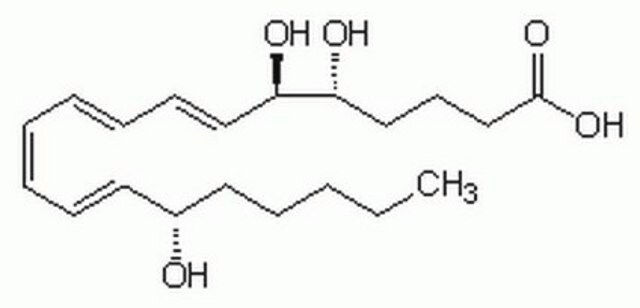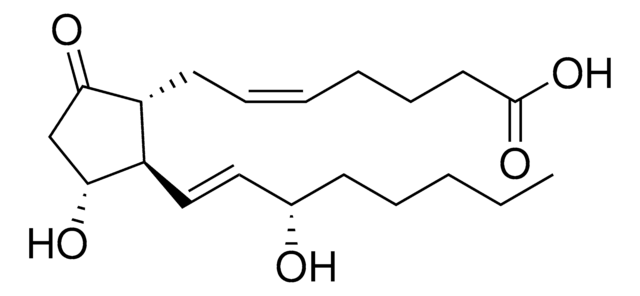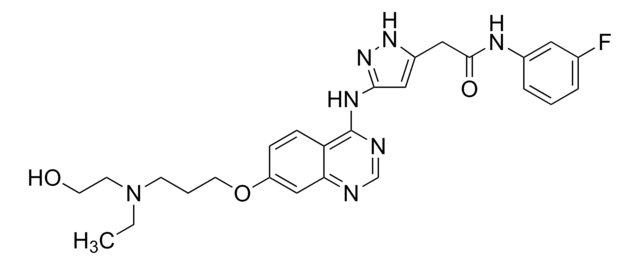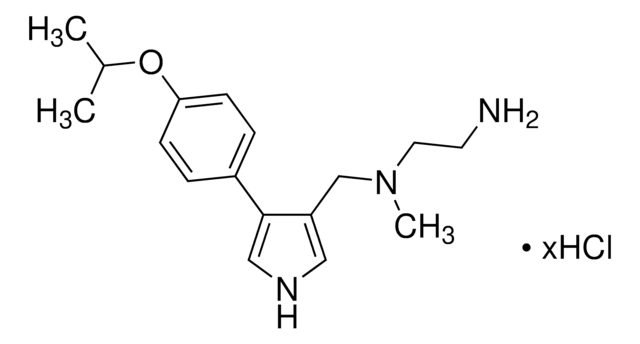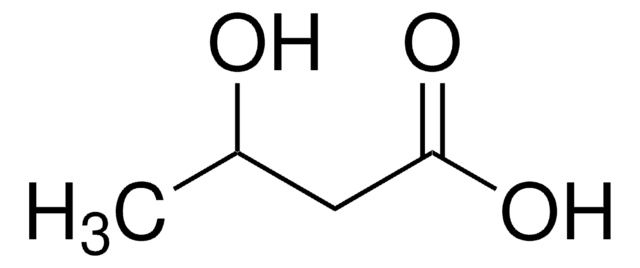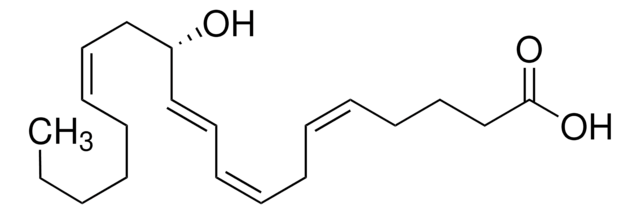H1640
12(S)-Hydroxy-(5Z,8E,10E)-heptadecatrienoic acid
≥93% (HPLC), ethanol solution
Synonym(s):
12(S)-HHT
Sign Into View Organizational & Contract Pricing
All Photos(1)
About This Item
Empirical Formula (Hill Notation):
C17H28O3
CAS Number:
Molecular Weight:
280.40
MDL number:
UNSPSC Code:
12352211
PubChem Substance ID:
NACRES:
NA.25
Recommended Products
biological source
synthetic (organic)
Quality Level
Assay
≥93% (HPLC)
form
ethanol solution
functional group
carboxylic acid
shipped in
dry ice
storage temp.
−20°C
SMILES string
CCCCC[C@H](O)\C=C\C=C\C\C=C/CCCC(O)=O
InChI
1S/C17H28O3/c1-2-3-10-13-16(18)14-11-8-6-4-5-7-9-12-15-17(19)20/h5-8,11,14,16,18H,2-4,9-10,12-13,15H2,1H3,(H,19,20)/b7-5-,8-6+,14-11+/t16-/m0/s1
InChI key
KUKJHGXXZWHSBG-WBGSEQOASA-N
Signal Word
Warning
Hazard Statements
Precautionary Statements
Hazard Classifications
Eye Irrit. 2 - Skin Irrit. 2 - STOT SE 3
Target Organs
Respiratory system
Storage Class Code
10 - Combustible liquids
WGK
WGK 3
Flash Point(F)
Not applicable
Flash Point(C)
Not applicable
Personal Protective Equipment
dust mask type N95 (US), Eyeshields, Gloves
Choose from one of the most recent versions:
Already Own This Product?
Find documentation for the products that you have recently purchased in the Document Library.
I Beck-Speier et al.
Environmental health perspectives, 109 Suppl 4, 613-618 (2001-09-07)
Agglomerates of ultrafine particles (AUFPs) may cause adverse health effects because of their large surface area. To evaluate physiologic responses of immune cells, we studied whether agglomerates of 77-nm elemental carbon [(EC); specific surface area 750 m2/g] and 21 nm
Yohko Fujimoto et al.
Toxicology and applied pharmacology, 189(2), 96-99 (2003-06-05)
To explore the possible actions of endocrine disruptors on the autacoid synthesis in the body, we investigated the effects of nonylphenol (NP), bisphenol A (BPA), di-n-butyl phthalate (DBP), benzyl-n-butyl phthalate (BBP), and di-2-ethylhexyl phthalate (DEHP) on the formation of 12-lipoxygenase
Xiuling Li et al.
Archives of biochemistry and biophysics, 467(1), 20-30 (2007-09-21)
Both 12-hydroxyheptadecatrienoic acid (12-HHT) and thromboxane A2 (TXA2) are products derived from prostaglandin H2 (PGH2) catalyzed by thromboxane synthase. Whether or not they exhibit similar actions remains to be determined. While TXA2-induced activation of extracellular signal-regulated kinases (ERKs) has been
Yohko Fujimoto et al.
Biochemical and biophysical research communications, 344(1), 140-145 (2006-04-18)
In the present study, the effects of hypochlorous acid (HOCl), monochloramine (NH(2)Cl), glutamine-chloramine (Glu-Cl) and taurine-chloramine (Tau-Cl) on the formation of 12-lipoxygenase (LOX) metabolite, 12-HETE, and cyclooxygenase (COX) metabolites, TXB(2), and 12-HHT, from exogenous arachidonic acid (AA) in rat platelets
H John et al.
Chemistry and physics of lipids, 95(2), 181-188 (2001-07-19)
It is shown that 12-(S)-hydroxy-(5Z, 8E, 10E)-heptadecatrienoic acid (5-cis-HHT)--a physiological metabolite of arachidonic acid--is acid-catalyzed converted into a less polar substance with its maximum UV-absorption at (1)max=232 nm and a molar absorptivity of about epsilon=26600 +/- 200 M(-1)cm(-1). Using a
Our team of scientists has experience in all areas of research including Life Science, Material Science, Chemical Synthesis, Chromatography, Analytical and many others.
Contact Technical Service